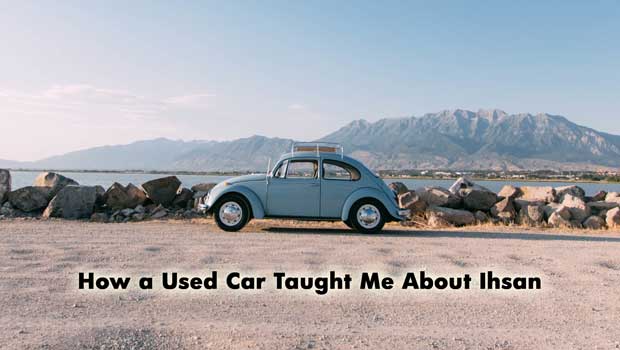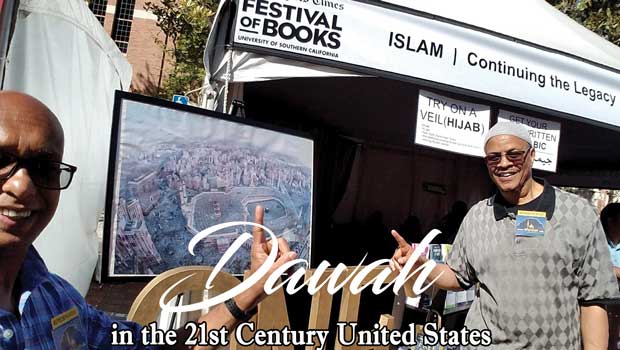If a man who is walking along the road finds a thorny branch and removes it, God thanks him for that and forgives him. (Bukhari 2305, Muslim 4750, Riyad al-Salihin 127)
Streets and public places would appear at first glance to be an unlikely concern for a Prophet of God. But it was all part of a comprehensive plan on the part of the Prophet Muhammad to establish a sound and prosperous Islamic society. And ensuring the public welfare, which included the safety of public places, was an inevitable part of that plan. And so, the Prophet spent a considerable amount of time safeguarding the public road.
“The Prophet was asked to curse the infidels. He said, ‘I have not been sent to curse people but as a mercy to all mankind’” (Muslim).
To begin with, it was made an inseparable part of belief and faith. In the celebrated tradition on the branches of faith, the Prophet declared that, “Faith has over sixty branches, the best of them the testimony that there is none worthy of worship but God, while the least of them is to remove an obstacle from the road” (Bukhari and Muslim).On another occasion, he likened it to an act of charity: “Removing harmful things from the road is charity” (Bukhari and Muslim).And on yet another, he declared this simple act to be a means of eternal salvation: “God created three hundred and sixty joints in every one of the children of Adam. Whoever declares the Glory of God, praises God, declares God to be One, glorifies Him, seeks His forgiveness, and removes a stone or thorn or bone from the people’s path, or commands something right or forbids something wrong, has accounted for the whole three hundred and sixty. In the evening of that day, he has rescued himself from the Fire” (Bukhari and Muslim).In a survey of all the good deeds performed by his nation, the Prophet chose to highlight removing obstacles from the road: “The actions of my community, both good and bad, were displayed before me and I found among their good actions removing obstacles from the road and among their bad actions spittle in the mosque which is not buried” (Muslim).Finally, he described an individual in Paradise: “I saw a man going about in Paradise because of cutting down a tree in the middle of the road which had been a nuisance to the Muslims” (Muslim).
This attention to the safety of public streets and roadways is not surprising, given the history of the Prophet’s early days in Makkah. Bitter opposition to the message of monotheism prevailed, and more than one neighbor took it upon himself to throw thorns, trash, and other items outside the Prophet’s home, and on the paths that he walked. Even the Quran references his aunt, described as “the bearer of firewood,” who participated in this harmful behavior (Quran 111:4). When the Prophet went about the city preaching, his opponents would often cast debris and stones wherever he walked, causing his feet to bleed. One notable example took place in the city of Taif, where the Prophet suffered considerable physical injuries, mostly involving his feet. He himself described that as the most difficult time in his entire life. Finally, he fell unconscious on the side of the road and upon awakening, was presented a choice by the angel Jibril: let God destroy the people or spare them. The Prophet chose, not surprisingly, to spare them. As Allah SWT says in the Qur’an, “And We have not sent you except as a mercy to mankind”(21:107).Abu Huraira reports: “The Prophet was asked to curse the infidels. He said, ‘I have not been sent to curse people but as a mercy to all mankind’” (Muslim).
In those early days as the head of a persecuted minority, the Prophet quietly cleared the debris from the roads and kept walking. Later, as the head of an organized and growing community, this mission to ensure the safety of roadways and public places didn’t stop. The Prophet instructed his followers not to hinder walkways, not to relieve themselves in public places or stagnant bodies of water, and forbade the poisoning of wells and the destruction of trees and public property even in wartime.
Contemporary applications of this Prophetic teaching include observing speed limits on highways, removing fallen trees and other debris after storms, sponsoring highway cleanup programs, properly securing vehicle loads, and participating in campaigns against drinking or texting while driving. Statistics show that texting while driving causes 1.3 million accidents in the United States each year and 11 teen deaths each day (textinganddrivingsafety.com).Road debris is recognized as an increasing danger on roads, causing 25,000 crashes per year and nearly a hundred fatalities (AAA Foundation for Traffic Safety, seewww.aaafoundaton.org). Addressing these issues is a moral imperative and we can all contribute to the cause of ensuring safer roads and public places. Indeed, let us remember that the individual who does his part, “God thanks him for that and forgives him.”





